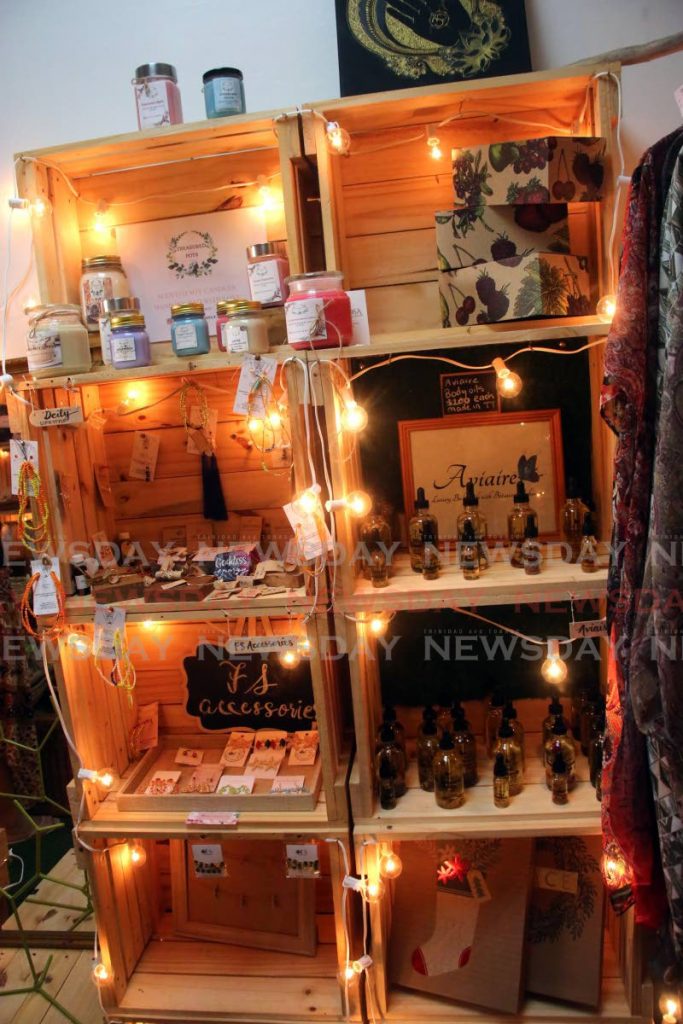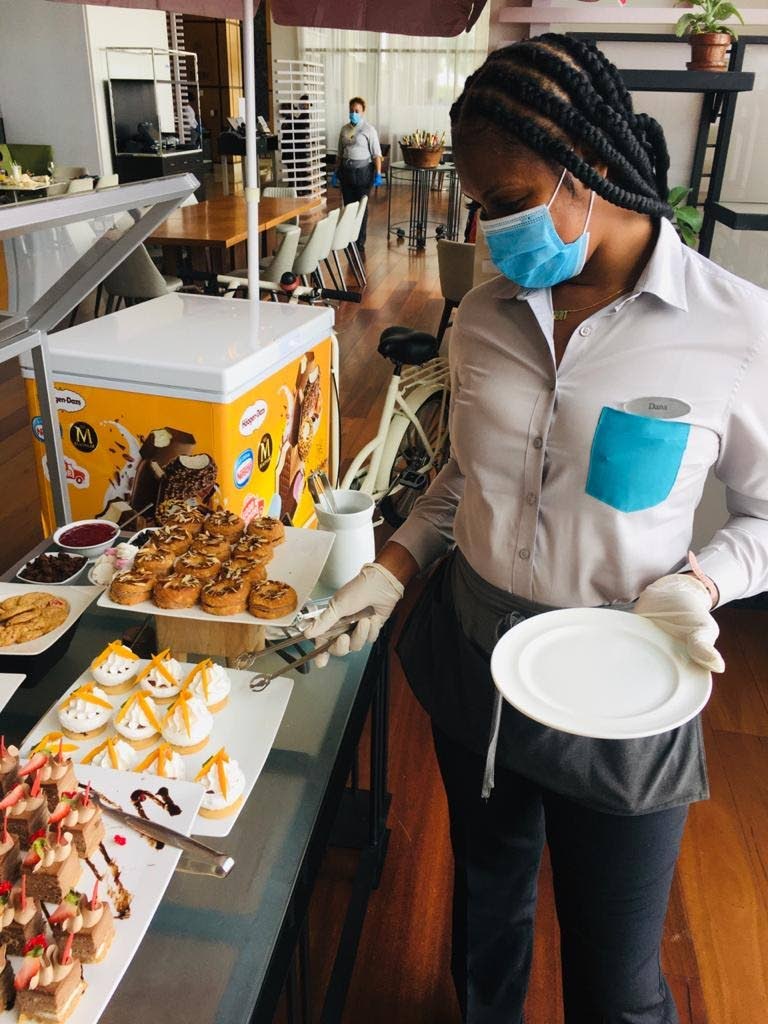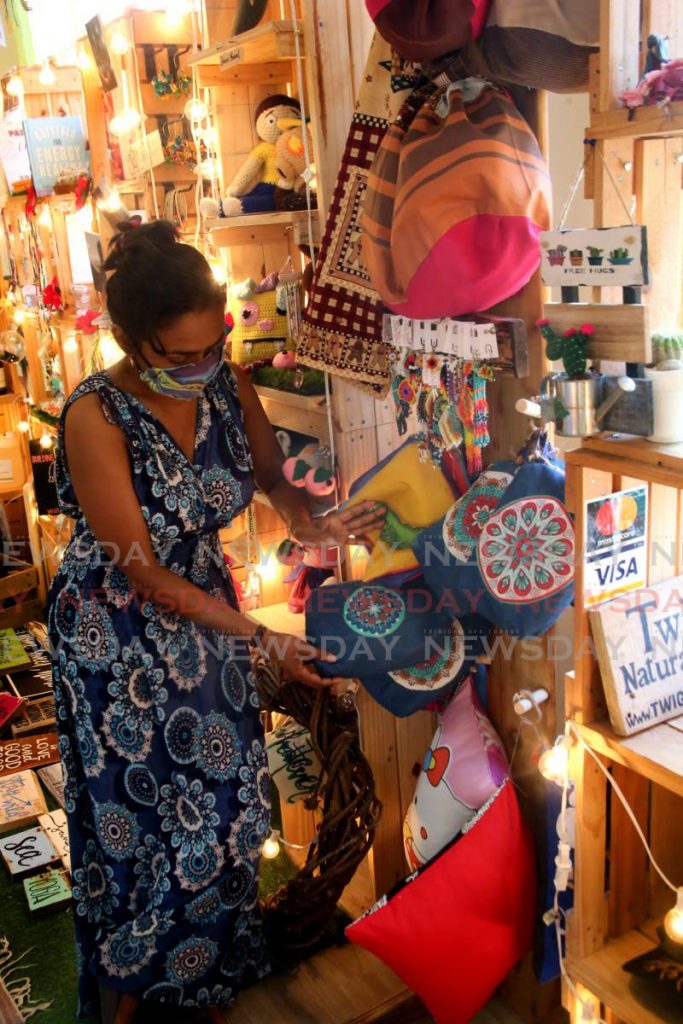Local heart-made gifts

THIS year crafters have been furiously at work producing for a number of different reasons. Some lost their jobs during the pandemic and turned to their crafting skills for an income, while others, under work-at-home orders, took to craft therapy to calm their nerves and soothe the pandemic stress.
The result? A variety of artisan crafts ready to be sold as Christmas presents.
Newsday visited the Junckollage Gypsy Caravan housed in One Yoga at the Oval, Woodbrook, on December 11 to see how sales were going for Christmas.
Junckollage has been around for three years. It started off as a small shop with five vendors and grew to become the home of 65 artisans’ brands. Vendors pay a nominal rental fee, which varies depending on how much space a they need.
The eclectic shop carries items such as jewellery, bags, hand-stitched kimonos, hand-painted keepsake boxes, dream catchers, skincare products, moisturising hand sanitisers, hand-painted hats, Christmas ornaments, potted plants, wrapping paper, honey and candles made from beeswax from local apiaries. For children, there are hand-made plush toys and children’s book Zee by Sheetal Daswani, a story about a little girl who wished it snowed in TT and got the surprise of her life when her dream came true. Junckollage items range from $25 to $2,000 depending on the product.
Junckollage owner, Rayya Mustapha, 30, has been selling her crafts since she was a university student. She makes half-moon pouches, reversible tote bags and dream catchers. For years she was a fixture in many local pop-up markets before settling into the Gyps Caravan, creating a space where she could sell her products.

“I made things I wanted to see in my own life. I made jewellery and clothes that I wanted to have and sold them in pop-up markets…Pop-up markets are fun, but I permanently wanted my own brand in a space. I made a space to solve the problems I had, and it benefited the artisans.”
Mustapha said when a person buys a Christmas gift from a crafter, three people benefit.
“You’re giving something to yourself because you’ve done something good. You’re giving something amazing to the person who is receiving the gift, and you’re giving something to the vendor.”
For many artisans, crafting used to be their side hustle and a means to make extra money. However, as people lost their jobs, turning their crafting into a business became a necessity.
“They never thought they would be using the thing they dreamt of doing as their full-time job and have had to do it now. They launched a business during a time of covid19 and it’s doing well for them. Buying from crafters means you’re supporting those people and their families.”
Junckollage is a hub for female entrepreneurs. Sixty-one of the artisans are women and many of them are young. Mustapha said those young women are graduating out of school and forming their own businesses and may not need to work for anyone to make a living.
The shop attendants are also vendors who know how to sell hand-made items, how to care for their own brands as well as the other vendors.
“They could talk about it with passion and take care of customers when they come.”

Giving gifts from artisans, Mustapha said is one way to ensure the present is unique.
“Heart-made gifts are one-of-a-kind hand-made items that you’re not going to get anywhere else. More than likely even the person who made them cannot replicate them because they came from a special place. When they try to remake something for a customer, that never quite comes out the same just because art comes from a place that comes through you, like its own magical entity.”
In July, Junckollage expanded for the third time. In a normal year, Mustapha said the period between Carnival and August would be a difficult time for artisans to sell their products. During the pandemic, when people lost their jobs, she didn’t think the store would survive.
“I thought the shop was going to close down. I didn’t want it to, but I didn’t think people would. In this time of uncertainty, I thought the vendors would drop off and customers would be looking at every penny.”
The opposite happened. In July, Mustapha saw Junckollage get an outpouring of support.
“People were coming through the doors. I think people were so desperate to feel good – in this time of just forgetting what it was like to feel good. This place is a feel-good place. You come here to be around things that are made with love and be around the heart-made items.
“This studio gives people a peaceful feeling. It’s a little magic in your life with the light in the time that feels dark. I see both the customers and the vendors just love it when they come here.”
Alana Ramlal, 40, has two businesses, Body Frosting and Second Pillow. Body Frosting is a bead jewellery line and Second Pillow is a patchwork and quilting line.
Both her jewellery and patchwork, Ramlal said are reminiscent of traditions indigenous women used. She makes bead-woven jewellery to emulate First People’s aesthetics and upcycles materials for her patchwork items.
Crafting is therapeutic for her, and during lockdown, she found ways to keep herself busy.
“It is soothing and therapeutic. Why pay for a therapist when you have craft at the fingertips?”
Quilting is a cultural practice among women circles. It is significant to her because of the historic culture of women sitting for long hours, sharing stories and making something together.
Each piece made would not be brand new. The quilt or blanket would be made from a patch that would be near and dear to family members such as a piece from a wedding dress or a square from a baby’s vest.
“Quilts would take generations to make and passed on to another generation.”
Though Ramlal loves to do blankets and quilts, she mostly does bags because the demand for larger items was not as great. Even before the pandemic, people would be drawn to smaller items because of cost.
At Junckollage she has upcycled cosmetic bag or pencil case and all the pieces of fabric are upcycled from jeans, inside is sheet lining. The jeans had a flaw, and patchwork used to cover the flaw.
“Every aspect were scraps that are made into items. I love taking value out of the garbage. There is a lot of value that is just thrown away. We’ve gotten into a consumerist mentality to not fix, cherish or repair things when it is broken, torn or stained. Just discard it or buy something new.”
While that may have been fine before 2020, Ramlal said she hopes this “new era” of financial management will teach people to value hand-made items and the contributions of local artisans.
“If we support local. If we recognise that small business owners are the drivers who can turn the economy around…Rather than looking to import, we can make a significant difference in TT and push us further along.”
She said she was lucky to have the skills and materials to produce under quarantine.
“I went immediately into mass production using the materials I’ve been hoarding. It is quite enjoyable…Nothing should go wasted. Nothing should be thrown away if it can be given a second life.”
Crystal Grainger, 37, was a freelance marketing and PR manager whose primary clients were in the entertainment and sports industry. Because all events stopped, Grainger had to rely heavily on her skincare line – Crystal Bliss and Jiivanna skincare – to live. She makes décor candles, herbal teas and skincare products. Her price range is from $25 to $295.
Growing up on agricultural land in Diego Martin, she became acutely aware of what she put in her body. As she got older, she became more particular about what she used on her skin. Not satisfied with the products available at the time, she made her own.
She went to a cosmetic conference in ExCeL, London to learn about skincare production and ingredients. She officially started her business in 2018. Junckollage is a means for her to showcase her products. She’s trying to push her brand in other stores and spas.
“Here has been steady. We have a lot of traffic here. A lot of people support local. This is one of the main hubs for local.
Her products have coconut milk, goats’ milk, jasmine, cocoa butter, mango butter and shea butter.
As best she can, she buys her products from local farmers.
“The ingredients are sourced locally. I support local businesses as I am a local business…It’s important to support local. We tend to forget the good stuff we have in Trinidad. The local artisans come up with local pieces. It should be shown more. More people should look into local businesses.”


Comments
"Local heart-made gifts"